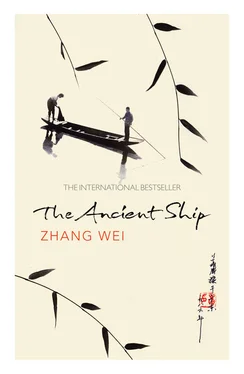1 ...7 8 9 11 12 13 ...27 One day Naonao came in wearing her white work apron, her arms exposed. Having just learned how to disco, she couldn’t wait to put on a show. Sticking out her hands, she ah-ed and ooh-ed a couple of times, under the hypnotic stare of Jiansu, who was clutching the twenty fen he’d just been given. He went up to her when she began to chew one of the treats. Her dark, shining eyes rolled as she surveyed the items on the rack and slowly moved the wad around in her mouth. Jiansu was just about to reach out and pull it when Naonao poked him in the chest. He stumbled backward, feeling a numbing sensation—she’d probably hit an acupuncture point. He sat down and looked up with cold eyes at the fireball that was Naonao, rolling around in front of the counter and from there out the door. He took a deep breath.
It was Duoduo’s first spoiled vat since opening the factory.
It lasted five days, and even though the losses were lighter than those from the spoiled vat of years before, Duoduo was frantic. Feeling helpless, he went several times to the mill, begging Baopu to come to the factory as a technician, but Baopu refused each time, preferring to feed the saturated beans into the eye of the millstone with his wooden ladle and then sit on his stool to watch the stone turn. Duoduo would curse him as he left the mill, vowing to shoot the woodenheaded man one day. “His head’s made of wood, why not shoot him?” As commander of the Gaoding Street militia during land reform, Duoduo had already shot several people, and he couldn’t think of a better candidate for a bullet than this member of the Sui clan. But Duoduo was getting on in years, and he no longer had a rifle. So he returned to the factory, where he was asked why he hadn’t brought Baopu with him. “He’s too busy sitting like a block of wood in the mill!” he replied, turning livid with rage.
Back and forth he paced, finding it impossible to control his nerves, until another member of the Sui clan came to mind. Without a second thought, he went to the Wali Emporium and asked Jiansu to take over as technician. Jiansu said no. Duoduo smiled and said, “There’s never been a member of the Sui clan who wasn’t born to this calling. Give it a try. I’ll pay you top wages. There’s always been someone who could right a spoiled vat.”
Jiansu laughed to himself, knowing that Duoduo had actually set his sights on Baopu. While Jiansu was thinking the offer over, Zhang-Wang joined the conversation, urging him to take what looked to be a fine opportunity; just how good he wouldn’t know until he gave it a try. “What about the shop?” Jiansu asked.
The dark folds on Zhang-Wang’s neck jiggled as she gave him a hard stare and said, “The shop will still be yours, I’ll just run it for you. I’ve been taking care of business all along, haven’t I?” Jiansu looked out the door into the sky and smiled.
So Jiansu returned to the factory, leaving the Wali Emporium in the hands of Zhang-Wang, who sat behind the counter for two hours every day. Business did not suffer a decline. Without telling anyone, she added orange peels to the liquor vat and diluted it with cool water. She carefully organized the rest of her day, her early-morning hours with household duties and, when the sun was up, massaging Fourth Master’s back. All these she handled easily, though the man’s back caused her a bit of apprehension. Only two years away from his sixtieth birthday, he was still healthy and energetic. But there was a noticeable thickening of his back. She had massaged that back for decades with hands and fingers that had grown dexterous from fashioning her clay tigers. Her massages brought Fourth Master unparalleled pleasure, but in recent days she had begun to feel her strength ebb. One day, while she was kneading his back, she told him that Hanzhang, his foster daughter, ought to take over. He responded by shifting his rotund body, which was covered only by a towel for modesty’s sake, and snorting. It was the last time she brought up the subject. The red, round sun would be making its way into the sky when she left Fourth Master’s house and went to the shop to sit behind the counter, slightly out of breath.
As for Jiansu, who found the factory more to his liking, he stayed away from the shop, going back no more than once a month to attend to the accounts. The factory, big as it was, was still run more or less as a workshop; only the name had changed. But many of the former workers, unwilling to work for Zhao Duoduo, had left, and the majority of their replacements were women. Two shifts kept the factory running around the clock. As the nights grew longer, the heated air had a soporific effect on the workers, and the sight of all those women nodding off beside the starch vat and under the water basin was a delight. As technician in charge, Jiansu was not required to keep to a rigid schedule; he could check on the work any time he wanted.
After the sun went down, he changed into a light purple fall jacket and a pair of straight-legged indigo pants that he tucked into shiny high-topped rubber boots. Thick black hair made his face appear unusually fair. One after the other, he studied how each of the women looked as they slept, a trace of derision at the corners of his mouth. This turned his face even paler and lit up his eyes. After he’d stood there awhile, they would wake up, one after the other, and yawn.
A chubby woman by the name of Daxi started coughing any time she saw Jiansu and did not stop until her face was red. She was not one of the better workers, and when she washed the noodles, they often fell to the floor in front of the cold-water basin. Once, while she was coughing, Jiansu walked up and kicked the gooey mess, which stopped the coughing fit. She belched and stared at him, but he strode past her, his rubber boots making squishing sounds. At that sound the yawning women got to their feet and went back to work sifting the noodle mixture. Their white aprons fluttered in the room’s heavy mist; the unique fragrance of the shop began to spread like perfumed rouge.
An iron strainer full of holes hung above them, and when the sticky bean starch was poured into it, silvery threads of glass noodles streamed through the holes and into a steamy pot, where they turned clear. Sitting up high working the ladle was a swarthy man who, on this particular day, had just awakened when Jiansu entered. With a shout, he pounded on the strainer ostentatiously, his head swaying, filling the room with a rhythmic banging sound. Jiansu sat down to smoke, eyes sparkling behind a patch of hair that had fallen over his forehead. For half an hour he didn’t say a word; then he jumped to his feet and ran out, not looking back, passing by the women like a flash.
Jiansu ran out onto a tall concrete platform, where he stopped to catch his breath as he looked up at the moist stars in the sky and listened to the sounds of water flowing in the Luqing River. The millstone was still turning, still rumbling; he turned toward the row of small windows on the riverbank, through which light shone weakly. Baopu would be behind one of them, sitting on his stool and tending the millstone. Jiansu wished the window would open to let the light out, if only briefly. With a sense of disappointment he stepped down off the platform and walked to the building around the corner from the processing room, stopping just outside. Light emerged from inside, as did the sound of snoring, and he knew that the factory manager, Duoduo, was sleeping in there. Taking hold of the handle, he held his breath and opened the door slowly. Once inside, he quietly closed it behind him and turned around. Duoduo was on his back, warmed by the heated kang, wearing only a pair of black underpants. Made of thick, hard material, and shiny, they were disgusting. The older residents of Wali, with the exception of Sui Buzhao, were all getting fat. Duoduo’s fleshy belly was distended. His beard was graying, the skin on his face was sagging, and there were strange purple splotches on his cheeks. His slightly green lips were parted, revealing one of his front teeth. As he studied the face, Jiansu discovered that the left eye wasn’t completely closed, and that made his heart lurch. He stayed perfectly still, except for his hand, which he passed over the slightly open eye. It didn’t flicker, and he breathed easier. Duoduo’s prominent Adam’s apple moved in concert with his loud breathing. He had, for some reason, placed a cleaver on the windowsill near him. Although there were rust spots on the back edge of the blade, it appeared to be quite sharp. The blood drained from Jiansu’s face when he spotted the cleaver. He stood there a while longer and then left quietly.
Читать дальше












